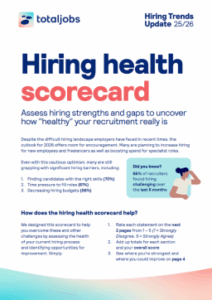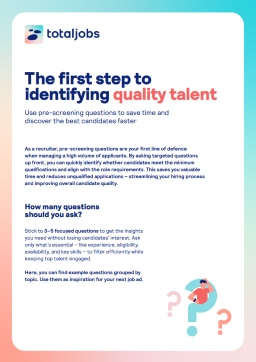
Skills-based hiring: What it is, and why it matters
Table of Contents
- Key takeaways
- What is skills-based hiring
- Skills based hiring on the rise
- 5 advantages of skills-based hiring
- Implementing skills-based hiring
- The future of recruitment
- FAQs

Skills Based Hiring Template

Hiring Health Scorecard
Skills shortages are one of the biggest challenges facing UK employers, with our research suggesting that 70% of recruiters experience difficult finding candidates with the right skills.
As a result, many employers are turning to skills-based hiring in order to source and identify the talent they need. In this article we’re taking a closer look at the definition of skills-based hiring, the advantages of hiring people based on skills, and how you can implement a skills-based hiring programme within your organisation.
Key skills-based hiring takeaways
- Skills-based hiring opens up talent pools that include self-taught professionals, career-changers and non-traditional educational paths.
- Hiring for skills helps improves fit and retention, as employees with the right skills feel more fulfilled and stay longer.
- Finding candidates with the right skills is a challenge for 70% of recruiters
- Skills-based hiring is not one-and-done. It requires continuous iteration and refinement of screening, assessment and interviewing.
What is skills-based hiring
Skills-based hiring is a recruitment approach that centres on evaluating candidates on their skills, competencies, and capabilities relevant to the job role, rather than relying on traditional markers such as experience or education.
These conventional indicators often prove to be inadequate predictors of workplace performance, making them less effective as selection tools.
The core focus of skills-based hiring is to identify candidates who possess the precise skills necessary to excel in a position. By prioritising skills over other factors, this method ensures a closer alignment between the individual and the job requirements.

The key objectives of skills-based hiring include:
- Enhancing the quality of hires
- Streamlining recruitment for employers and candidates
This approach acknowledges that skills are the most accurate predictors of performance and success in the workplace. By leveraging this insight, employers can construct robust and agile teams capable of meeting the demands of an ever-evolving landscape.
Why skills-based hiring is on the rise
Almost a third of UK businesses are expecting to face skills shortages moving forward. As a result, it should come as now surprise that skills-based hiring is now a top priority for 43% of employers.
29%
of UK businesses expect skills shortages to be a challenge
Additionally, Rand Ghayad, Chief Economist and Senior Vice President of Policy & Economics at the Association of American Railroads explained in a World Economic Forum article that a “skills-first model allows employers to not only find the best workers but also retain them during a time when it is historically difficult to do so.”
“Adopting a skills-first hiring approach can offer companies a means to fill critical skill gaps and stay competitive in a challenging labour market, as it broadens the range of candidates they consider,” he added.
In addition to this, there are various reasons why skills-based hiring is gaining momentum, such as:
- Performance focus: Organisations are increasingly prioritising performance, and demonstrable skills provide a reliable gauge of a candidate’s potential to deliver results.
- Changing dynamics: As the workplace evolves, employers are seeking candidates with adaptable skills who can thrive in ever-changing environments.
- Technological advancements: The rapid pace of technology, driven by developments like artificial intelligence, demands employees with cutting-edge skills and competencies.
- Efficiency: Employers are aiming to boost efficiency and minimise resource waste, prompting them to hire based on skills that align with streamlined processes.
- Future-proofing: Given the constant changes in business and technology, companies are focused on skills that will be crucial for future success, helping them stay resilient in the long term.

Skills shortages won’t solve themselves, especially in fast-evolving sectors where the market can’t produce experienced talent quickly enough. To stay ahead, employers should invest for the long term by hiring for potential, bringing in people with transferable skills and upskilling them to bridge gaps. This not only builds capability but also fosters loyalty and long-term performance.
Bianca Stringuini, Global Inclusion Lead, The Stepstone Group
5 advantages of skills-based hiring
Skills-based recruitment is undoubtedly an important way to overcome the skills gap challenge in the UK, but there are a number of other key advantages to it.
Let’s examine 5 of the most significant.
1. Improve quality of hire
People professionals often find that a skills-based hiring approach is a great way to improve the quality of a hire.
That’s because workers will not only be more effective in a role where they have the skills and competencies required to thrive, but they will also feel like a better fit and therefore be more fulfilled.
Hiring based on traditional criteria such as education and experience alone can easily result in bringing in a candidate who does not have the required skills to be effective, and this will in turn result in problems for the organisation and the employee.

Explore our guide to attracting better quality applications that ultimately result in increased quality of hire.
2. Grow talent pools
In the past many organisations have relied on more traditional talent pools, sometimes recruiting from specific universities or course cohorts.
However, focusing instead on skills-based recruitment widens the talent pool to a more diverse group of candidates with different backgrounds and experiences.
Ultimately, by concentrating on the skills of potential candidates over criteria like education and prior work experience, hiring managers can extend their search and thereby leverage a significantly larger pool of otherwise untapped candidates.
3. Improve adaptability
New technologies, new ways of working, and new employer and employee expectations require new hiring methods to ensure your organisation can stay adaptable and agile.
Skills-based hiring can be a key part of keeping adaptable as job requirements evolve.
Instead of having set criteria for new hires, skills-based hiring looks at the needs of an organisation here and now, making it possible to onboard talent with the specific skills an employer requires.
4. Boost retention
One of the added benefits of improving the quality of a hire through skills-based recruitment is that a happy employee who is a good fit is much more likely to stick around for the long term.
With skills gap in the UK creating competition for talent, it is critical to not only hire the right people, but also to retain skilled employees. By hiring based on skill and ensuring employees feel productive and valued, employers can look to ensure they feel more fulfilled and therefore less likely to look to move elsewhere.
5. Reduce bias
Another major benefit of skills-based hiring is that it leads to a reduction of bias in the recruitment process.
That’s because evaluating candidates based on skills during the hiring process means focusing on objective criteria, rather than any subjective notions that stem from looking at things like education or background.
This creates a more inclusive, equitable process, that will then be reflected within your organisation as more people are hired based solely on merit rather than bias.

Uncover more about the benefits of a skills-based approach

Learn how to identify the skills your workforce needs
How to implement skills-based hiring
Creating a skills-based hiring process within your organisation is simple enough, and often just requires some adjustments to the processes already in place. For some organisations that do things in a more traditional way, it can however take significant planning to maximise success.
Let’s take a closer look at some of the main ways to implement skills-based hiring.

Join our webinar on 26th November for practical skills-based hiring tips and advice
What every employer needs to known about skills-based hiring
Identify the skills you’re looking for
A large part of the work required for a successful skills-based hiring strategy starts with identifying the skills your organisation or the role in question needs.
For example, our research has found that 73% of businesses are now more likely to prioritise a candidate with generative AI skills over one without when hiring for entry-level roles, as they anticipate the increasing importance of generative AI in the coming years. The research also found that 64% of HR professionals think generative AI skills are more important than A levels for candidate success.
While there is a clear need for specific technical skills to meet your organisation’s current and future needs, skills-based hiring isn’t only about the hard technical skills. Soft skills are growing in importance too. For a well-rounded skills-based hiring process, remember to include the soft skill sets your organisation will benefit from.
Rework candidate screening
To find the right candidates to consider for a role, you may need to do some work on your candidate screening processes. This might involve ensuring you are screening for skills and achievements that relate to the requirements of the role.
You may even consider removing any information that isn’t grounded in skills-based hiring to make sure these factors are not clouding judgment or encouraging bias to creep back in. This might include:
- Candidate names
- Addresses
- Education
- Past jobs
Utilise skills-based assessments
To successfully implement skills-based hiring, employers can look to objectively measure a candidate’s skills. The most reliable approach is to incorporate skill assessments during the hiring process.
Skill assessments provide measurable tests to gauge a candidate’s proficiency, whether in hard skills like technical knowledge or soft skills like communication and teamwork. By using tailored assessments, employers can ensure they are evaluating the specific skills required for the role, leading to better hiring decisions and a more skilled workforce.
Review the interview process
Once you’ve completed your initial screening and assessment to narrow down the set of candidates for a role, the interview process is the next step in the skills-based hiring process to examine. Using other approaches to hiring, interviews can tend to place emphasis on previous experience and things like personality and public speaking. However, to develop a true skills-based assessment process, interviews should be geared more towards skills.

Check out our free guide to conducting candidate interviews in 2025 for more on insights into how a structured process can help you identify and onboard talent with the skills you need.
Competency-based interviews can be implemented to find evidence of a candidate using the required skills in previous roles, which can be a good demonstration of their ability. However, employers might also consider asking questions about hypothetical situations or future scenarios to see how the candidate would use their skills to solve those problems.

Top tip: Replace unstructured chats with competency-based interviews.
Continually monitor progress
Following implementation, employers should consistently monitor and refine their skills-based hiring practices to ensure they’re effective and to identify areas for improvement. This can involve evaluating key metrics such as:
- Quality of hire
- Staff retention and turnover rates
- Overall employee satisfaction
To gather relevant insights, employers can analyse data on staff performance, conduct internal surveys to measure satisfaction and collect feedback from line managers about the effectiveness of the hiring process. By tracking these indicators, employers can fine-tune their skills-based hiring approach for better outcomes.

Top tip: Set KPIs around things like quality-of-hire index, 90-day performance and retention at 12 months.
The future of recruitment
Skills-based hiring is a strategic response to widening skills gaps and shifting neds. By prioritising measurable skills over credentials, employers can unlock more diverse talent pool and reduce bias while also working to effectively strengthen retention in the long0term.
Skills-based hiring FAQs
What is skills-based hiring and how does it work?
Skills-based hiring is a recruitment approach that focuses on a candidate’s skills and abilities rather than traditional qualifications like degrees or job titles. Employers assess candidates using practical evaluations, work samples, or skills tests to determine how well they can perform in the role.
What are the key benefits of skills-based hiring for employers?
The benefits of skills-based hiring include improved job performance, better candidate-job fit, reduced hiring bias, and a more diverse workforce. It also helps employers fill roles faster and more efficiently by focusing on capabilities rather than credentials.
How can skills-based hiring reduce time-to-hire?
By evaluating skills early in the recruitment process, hiring teams can quickly identify top candidates and avoid lengthy resume screening. This targeted approach leads to faster shortlisting, reduced interview rounds, and quicker onboarding, ultimately cutting down time-to-hire.
What types of roles are best suited for skills-based hiring?
Roles that prioritise technical abilities, soft skills, or hands-on experience, such as in tech, customer service, marketing, and trades, are ideal for skills-based hiring. However, this approach can be adapted to nearly any role where performance can be measured by demonstrated skills.
How do employers assess candidates in skills-based hiring?
Employers may use a variety of tools such as skills assessments, job simulations, structured interviews, and task-based challenges to evaluate a candidate’s abilities. These tools offer objective insights into how well someone can perform in the role.
Explore articles
Receive the latest recruitment resources and
advice to boost your hiring
By providing us with your details you agree to our privacy policy and for us to keep you updated with the latest news, events,
and special offers from Totaljobs.









